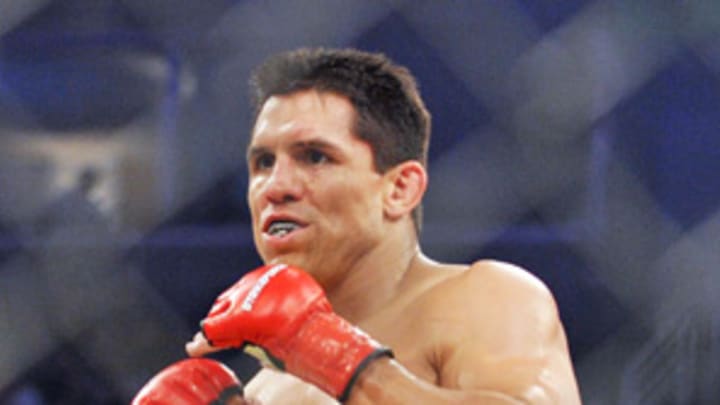Frank Shamrock: The meaning of 100


Prior to UFC 100, SI.com had the chance to speak with many of the promotion's elite fighters -- past and present. Here's what Frank Shamrock had to say about Saturday's card, his career in the cage and much more.
One-hundred -- It's a big number, a nice number.
It says that we're getting there, becoming a professional sport. That's what the number means to me. That's good. That's positive. The longer we stay around, the more we can regulate ourselves and become available and acceptable to everybody.
Longevity in the market place is like attrition, and eventually people are going to be like 'Well, I guess cage fighting's OK.' The number shows to me that we're not just going to disappear overnight.
I was there at the beginning and it was just not right. No one wanted to see MMA. Now, everyone wants to see it. It's an entirely different acceptance, understanding and, I think, appreciation. Plus, our society is in a different place now. I think that's a factor.
When i first started fighting, I didn't think they'd have numbers; I thought they'd move on to something a little cleverer. I mean, come on. I'm not dissing the 100. I thought it would be something cooler.
I don't know Georges that well but I would be convinced to watch for that. I think he'll win. I think Brock Lesnar is going to beat Mir. And I always gotta go with Dan, he's my friend. He's beat us up so many times, you gotta be nice to Dan. I hear Michael's tough. I've been talking to Phil Baroni and he says Bisping is surprisingly strong and he's got game.
I'm rooting for Mark Coleman.
Initially I knocked Lesnar getting a title shot so soon, but really it was just a chance to jab UFC because it was funny. How hard they purport to not be pro-wrestling, but they hire the biggest pro wrestler in the world and give him a title shot. But, hey, he filled the seats. It's a Kimbo thing. He won, he earned it. Bam, there it is. I've been on both sides of the fence, but putting everything together, he earned it.
UFC 100 ranks right behind my fight with Tito at UFC 22.
For the UFC to continue to be successful, they gotta let go of the stranglehold and start telling the truth a little bit more. A real sport has real media, and has pros and cons to it. That's what makes it a sport and that's what makes its history.
Someone told me one day that I was a professional martial artist. It was at a trade show somewhere. But him telling me that made sense to me, that that was my job. I wasn't a fighter per se. That was my job and my whole life.
I did a lot of stuff to help change peoples' views of the sport, both hand to hand and person to person. Politically and everywhere else we could. I'm really proud of that.
The hardest part about being a fighter is it's kind of lonely in a way. You spend a lot of time training and by yourself. You're going through a process no one else can really get.
The best part is you can do anything you want. I say that because we're in a sport where you can become, in three fights, heavyweight champion of the UFC. The sport is so young and malleable and fresh that you can, with some serious heart and training, the best in a couple years and establish yourself for the rest of your life.
When I'm hurt, I don't like fighting as much. I'm not as excited because I'm worried. When I was fighting in Pancrase in the old days, and that relationship soured, I didn't like that.
Little challenges keep me motivated. I keep challenging myself in different ways, either learning or teaching or staying physical. It keeps me going.
My family, they love my profession, though I think it stresses my wife out.
The toughest fighter in the UFC? Dana White. Hands down.
